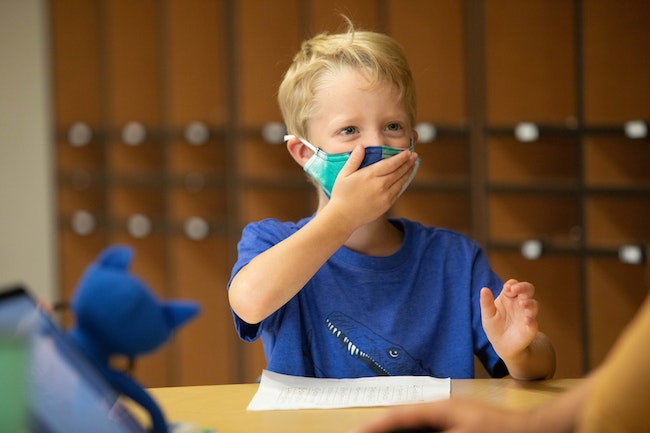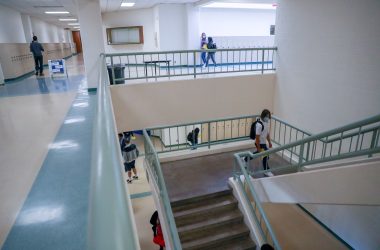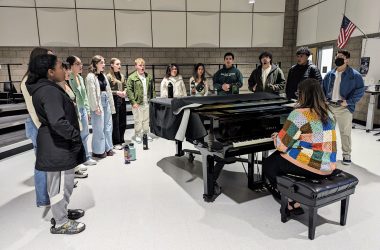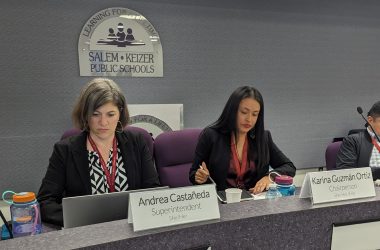
James Gough, an incoming kindergartner at Kalapuya Elementary School, laughs after making a mistake on an assessment test to gauge his alphabet comprehension on Thursday, September 17. (Amanda Loman/Salem Reporter)
The twenty-one students in Emma Kubishta’s kindergarten class started with the basics: a capital letter “A.”
They watched on their laptop screens as their teacher sprinkled “magic pixie dust” on her finger, then traced the letter in the air. Kubishta asked her students to join her, tracing the letter on the table or desk in front of them.
“Excuse me teacher? I’m at my room, I’m down there!” one girl interjected, sitting on the floor.
“Can you put your finger on the carpet on your floor?” Kubishta asked.
“Okay!” the girl replied.
Across the Salem-Keizer School District, 2,400 kindergarten students began class online on Tuesday, part of perhaps the largest-scale disruption in K-12 education in U.S. history. Teachers and parents are now tasked with keeping groups of small kids on-task as kids sign in from their bedrooms, kitchen tables, living room floors and childcare centers, sometimes forgetting to bring pencils along with them.
Kindergarten enrollment in the district so far this year is lower than the roughly 2,900 students administrators projected would sign up, mirroring a national trend that reflects the challenges of learning online for young kids.
District administrators, teachers and parents interviewed who are trying to make the best of this year all agreed educating six-year-olds online wasn’t optimal. And there’s little research suggesting how the attempt might impact kids as they move through the school system.
“We don’t know, because we haven’t done this as a planet. What does it look like to have all of our students educated online for a significant period of time?” said Suzanne West, elementary school curriculum director for Salem-Keizer. “We do have concerns about that. It’s a conversation that we have regularly about how we’re going to maximize the time that we do have with students.”
Early in the year, kindergarten classes focus on teaching kids how school works, practicing skills like lining up for lunch or quieting down when the teacher is trying to get the group’s attention.
Online, principals and teachers are going over new habits like muting and unmuting microphones and remembering to bring workbooks to grandma’s house so they can sign in ready for school.
At Hoover Elementary School, principal Bridget West went over online learning expectations in a virtual morning assembly, “Friday Fun Day,” for the school’s kindergarten through second grade students. She showed photos of herself with a blanket over her head, then holding a phone in front of her face, to demonstrate what not to do.
“This person is on their cell phone in the middle of learning. Is that a thumbs up or thumbs down?” she asked. Dozens of students on Zoom held a thumb down.
The meeting also incorporated a “freeze dance,” with shy students and enthusiastic teachers showing off dance moves to Kidz Bop covers of Taylor Swift and Pharrell.
No one is expecting kindergarteners to sit on Zoom for the six hours per day they’d normally spend in class, said said Olga Cobb, one of the district’s elementary school directors. Exact schedules vary by elementary school. Most are holding live classes in the morning, with afternoons spent working independently or in virtual small groups.
Kubishta dismissed her class for lunch by asking them to review a story in their books. The class would resume on Zoom two hours later, giving kids time to eat and go over the work solo.
Teachers will also use software with games to help kids learn numbers and basic math, allowing them to work on their own, Cobb said.
Unlike in the spring, there’s been no trimming of the materials teachers would normally cover in a school year, Cobb said. The first days are focused on “building up community because they have never met each other, they have never been in a brick and mortar school,” she said.
In-person meetings helped most students and teachers begin kindergarten. Last week, about 80% of new kindergarten students met their teachers one-on-one for a brief test to assess where they’re at in their education and conversation about what to expect for the year.
 Teacher Kara Buchheit talks with Kristen Gough and son James, an incoming kindergartner at Kalapuya Elementary School on Thursday, September 17. (Amanda Loman/Salem Reporter)
Teacher Kara Buchheit talks with Kristen Gough and son James, an incoming kindergartner at Kalapuya Elementary School on Thursday, September 17. (Amanda Loman/Salem Reporter)
At Kalapuya Elementary School, James Gough concentrated as he read a row of letters off a sheet of paper: “O, M, B, X, C.”
Across a table, kindergarten teacher Kara Buchheit took notes while encouraging him. “Good job! Rock star!” she said.
In a normal year, students receive the same brief test in class during the first weeks of school. The results help teachers understand students’ abilities: how many letters they can sound out, how many numbers they can read, and how they interact with other students. Data from those tests also goes to the district and state to assess how prepared for kindergarten the average student is.
Gough, who has two older siblings at Kalapuya, scored high on the test. His mother, Kristen, said she’s fortunate to be able to supervise all three kids at home without juggling a job. She said she’s going to do her best to get through the year without worrying about whether her kids complete all their work perfectly.
“I’m not going to kill myself over this,” she said with a laugh.
Her son’s enthusiasm for school hasn’t been dampened by the online start, she said, though James wasn’t always clear what school would look like.
“I think he’s excited about the idea of it. I had to repeat a few times that we weren’t actually going to school,” she said. “He kept thinking he was going to ride the bus with his buddy.”
Buchheit said brief meetings like the one she had with James help her tailor her teaching – but most importantly, it gives her a chance to connect with kids so she’s not just a face on a screen.
She planned to work up to hours of online instruction because she doesn’t want kids to get burnt out and dislike school during their first weeks. She wants them to log off wanting more time with their teacher and friends online.
“It’s going to be a learning curve for sure,” she said.
SUPPORT ESSENTIAL REPORTING FOR SALEM – A subscription starts at $5 a month for around-the-clock access to stories and email alerts sent directly to you. Your support matters. Go HERE.
We want to hear how online school is going for your family, whether you’re a parent, teacher or both. Contact reporter Rachel Alexander: [email protected] or 503-575-1241.

Rachel Alexander is Salem Reporter’s managing editor. She joined Salem Reporter when it was founded in 2018 and covers city news, education, nonprofits and a little bit of everything else. She’s been a journalist in Oregon and Washington for a decade. Outside of work, she’s a skater and board member with Salem’s Cherry City Roller Derby and can often be found with her nose buried in a book.









